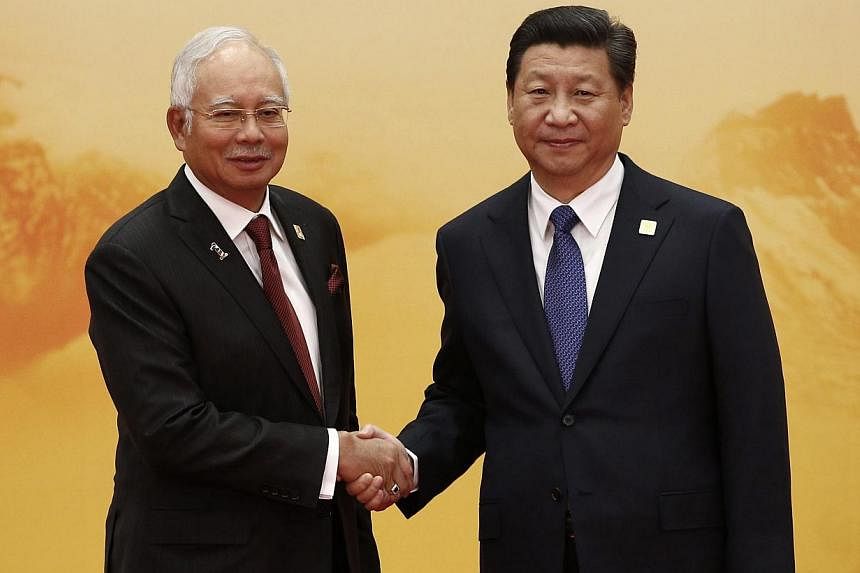This year, Malaysia, a claimant state to disputed islands in the South China Sea, is taking over as chairman of Asean.
Given Malaysia's long tradition of constructive and stable relations with China, this is an unprecedented opportunity to step up the anaemic negotiations over a Code of Conduct (CoC) in the South China Sea.
The year 2015 could very well serve as a historic juncture to pivot away from territorial jostling and reconfigure the region's geopolitical trajectory. Simmering maritime disputes in the Western Pacific constitute the greatest threat to prosperity and peace in the region. It is high time Asean transcended diplomatic symbolism and empty rhetoric in favour of establishing concrete mechanisms, which can contribute to the rule-based resolution of inter-state disputes.
For decades, Asean has successfully prevented armed conflict among its member states. By all means, the South-east Asian region has become a de facto security community, whereby it is almost inconceivable for any Asean country to march into war with a fellow member state.
The threat or the use of force as an instrument of foreign policy has become a strategic anachronism. Instead of mobilising their militaries, Asean members primarily resort to diplomacy and rule-based mechanisms to resolve outstanding problems among themselves.
The same, however, can't be said about the relations between certain Asean countries on the one hand, and external actors on the other. This is particularly true in the context of the South China Sea, whereby China has been locked in a bitter territorial dispute with the Philippines and Vietnam - two key members of Asean which have progressively internationalised the maritime dispute to check China's territorial assertiveness. Asean has yet to forge an optimal response to this potentially explosive situation.
From border disputes between Cambodia and Thailand to the diplomatic crisis over Cambodia's controversial (and polarising) chairmanship of Asean in 2012, South-east Asian countries have displayed significant resilience in the face of division and conflicting national interests. Thanks to the diplomatic pro-activeness of influential countries such as Indonesia and Singapore, Asean has overcome difficult hurdles, continually reasserting its centrality as an engine of integration in East Asia.
But it is far from resolving the South China Sea disputes, where Asean's response has been largely reactive and incoherent. Under the chairmanship of Vietnam (2010) and Indonesia (2011), there were concerted efforts at negotiating a CoC with China, in order to operationalise the spirit of the 2002 Declaration on the Conduct (DoC) of Parties in the South China Sea.
Yet, so far, there has been limited follow-through on this front, largely due to the fact that the succeeding chairmen of the regional body didn't share enough sense of urgency and/or failed to mobilise significant diplomatic capital to address the issue.
Malaysia's chairmanship represents a potentially significant step forward in the right direction. Unlike other active claimant states in Asean, particularly Vietnam and the Philippines, Malaysia has astutely maintained robust and friendly relations with China. Given Malaysia's broad and active interest in the South China Sea, particularly in the realm of tourism and energy exploration, Asean's new chairman has an interest in preventing an armed escalation among disputing states.
China's ever-expansive paramilitary patrols, military drills and construction activities across the South China Sea have also been a growing source of concern to Malaysia, which has accelerated its efforts at augmenting its naval deterrence capabilities in recent years.
In short, Kuala Lumpur has been hedging its bets, increasingly concerned with the scope and intensity of China's maritime posturing.
Towards the end of last year, China sought to dial down tensions by reviving diplomatic channels with Japan, Vietnam and the Philippines, while proposing a hotline and a high-level defence dialogue with Asean. To express its goodwill, China has also offered multibillion-dollar trade and investment incentives to its Southeast Asian neighbours, which desperately need huge amounts of capital and advanced expertise to aid their economic development.
Chinese leaders have repeatedly emphasised the importance of maintaining stable ties with peripheral states, hoping to assuage the strategic anxieties of smaller neighbours, which have sought closer ties with the United States - Beijing's primary rival.
In the light of the fast-approaching deadline for the completion of the Asean Economic Community, Malaysia faces the daunting task of simultaneously pushing ahead with negotiations on two fronts: First, on contentious trade and investment concerns among member states ahead of plans for creating a common market in the region; and second, finalising crucial talks between Asean and China over the guidelines of the CoC and the implementation of the DoC provisions. Malaysia confronts a potential "agenda overload".
Against the backdrop of the risk of an agenda overload in Asean, it is highly important for disputing parties to step up their bilateral diplomacy and complement existing multilateral efforts at advancing economic integration and preserving maritime security in the region.
Overall, Malaysia's chairmanship provides a rare opportunity to display the country's diplomatic acumen and reassert Asean's geopolitical centrality in East Asia.
The writer is a political science professor at De La Salle University in the Philippines.
S.E.A. View is a weekly column on South-east Asian affairs.


